ULEZ survey 2023: has the latest expansion changed opinions?

In the years since London’s Ultra Low Emission Zone (ULEZ) was established, Bikesure has conducted surveys to learn how Londoners have received and reacted to it – and how ULEZ may impact their lives looking into the future.
With the zone expanding yet again, this time to cover all London boroughs from August 29th 2023, we want to understand to what extent changing opinions about the environment – as well as rising cost of living – have driven changes in opinions among different demographics and types of road users.
Do people feel they are being priced off the roads? How much interest is there in alternative transport like lower-emission cars and bikes? Is public transport the solution, or with 58.5% of respondents considering switching to buses and trains, will services that are already struggling with delays and strikes be able to cope with the increased demand?
Key findings
64% of respondents say the 2023 ULEZ expansion will impact how much they will drive in the zone due to financial or environmental impact, but 63% remain generally positive about the ULEZ expansion.
49% of motorcyclists think it’s a good idea, although nearly a third (31%) are feeling frustrated.
76% of motorcyclists believe that ULEZ has made them less likely to drive in the zone due to the cost.
While the proportion of people in 2023 who say that ULEZ has accelerated their plans to buy an electric vehicle is high (56%), this has dropped significantly since 2021, when the figure was almost three-quarters of respondents (73%).
Motorcyclists are more likely (73%) than car drivers (54%) to switch to electric as a result of the new ULEZ boundaries.
ULEZ 2023: Awareness and engagement
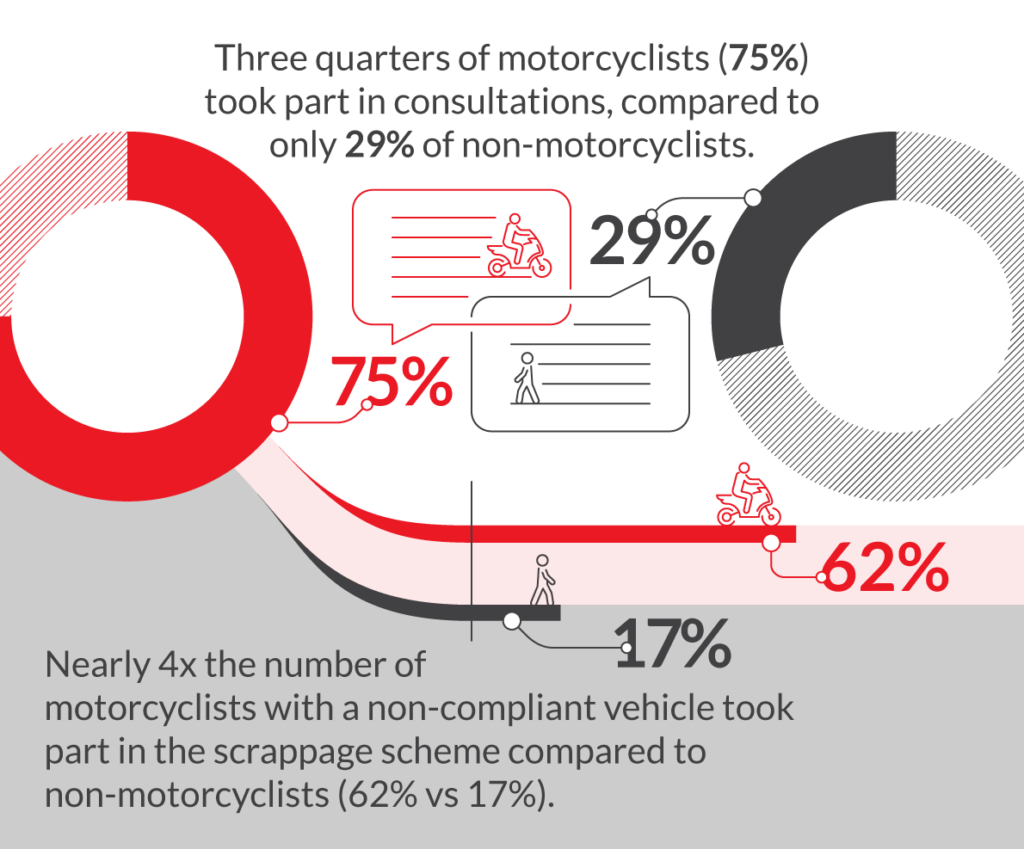
Before the ULEZ expansion was announced, road users were invited to take part in consultations, and a new £110m scrappage scheme was unveiled to support the owners of high-emission vehicles. But how many of the people who would be impacted by the changes were aware of the plans and the scrappage scheme?
While most (88%) said they were aware of how the 2023 ULEZ expansion will impact the journeys they regularly make, just over half didn’t participate in any of the government consultations. The exception was motorcyclists, who were by far the most engaged group. Some 75% took part in consultations, compared to only a third of non-motorcyclists.
The scrappage scheme encountered a similar lack of enthusiasm. Over half of road users with a non-compliant vehicle opted not to take part, and one in five are still planning on using their non-compliant vehicle in the zone despite the charges.
Once again, motorcyclists are revealed to be the most engaged group. Nearly four times more motorcyclists with a non-compliant vehicle took part in the scrappage scheme compared to non-motorcyclists.
How are ULEZ opinions changing?
Changes since 2021
Since Bikesure’s 2021 ULEZ survey, residents of the zone have become less supportive of the idea of further expansions. In comparison to 2021, the number of people who agreed with ULEZ but were frustrated by the added inconvenience has dropped by 11%. In direct comparison, those thinking there are more effective ways to protect the environment, or that it is a money grab, have risen by a combined 8%.
While the proportion of people in 2023 who say that ULEZ has accelerated their plans to buy an electric vehicle is high (56%), this has dropped significantly since 2021, when the figure was almost three-quarters of respondents.
We also observed more scepticism about ULEZ being the best solution for lowering pollution levels. The proportion of respondents saying that ULEZ is a bad idea and there are better schemes to tackle climate change increased slightly, from 11% to 13%. While this is not a huge increase, it suggests that as ULEZ expands, doubt over its effectiveness grows.
Motorcyclists are the one type of road users whose support of ULEZ is growing. The number of motorcyclists who think ULEZ is a good idea and are glad of it increased by 12% in the past two years.
Differing opinions by age group
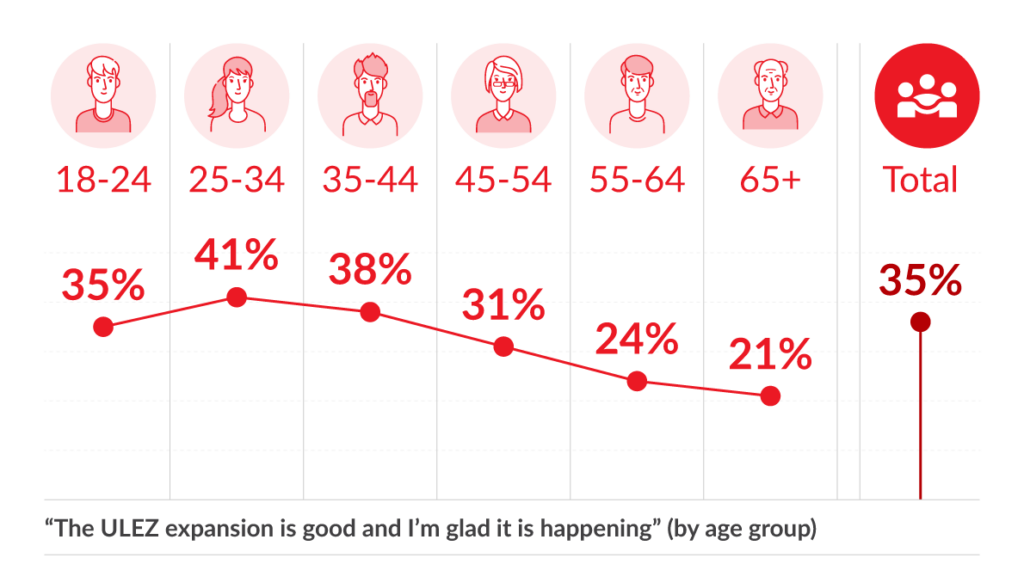
One of the most distinct splits in the survey findings is the increasing gap between older and younger road users. These groups split down distinct lines, with younger drivers more likely to understand the need for environmental change and more willing to support it, even if that means they are priced out of driving in London.
More than a third of 18-54-year-olds believe that ULEZ expansion is good and are glad it is happening, despite some 70% aged under 24 saying it will make driving in ULEZ zone unaffordable for them.
Older drivers are more likely to disagree. Four-in-ten of those aged over 55 said they believe expanding the ULEZ zone is a way to collect money rather than a legitimate way to reduce emissions.
Are people being priced off London roads?
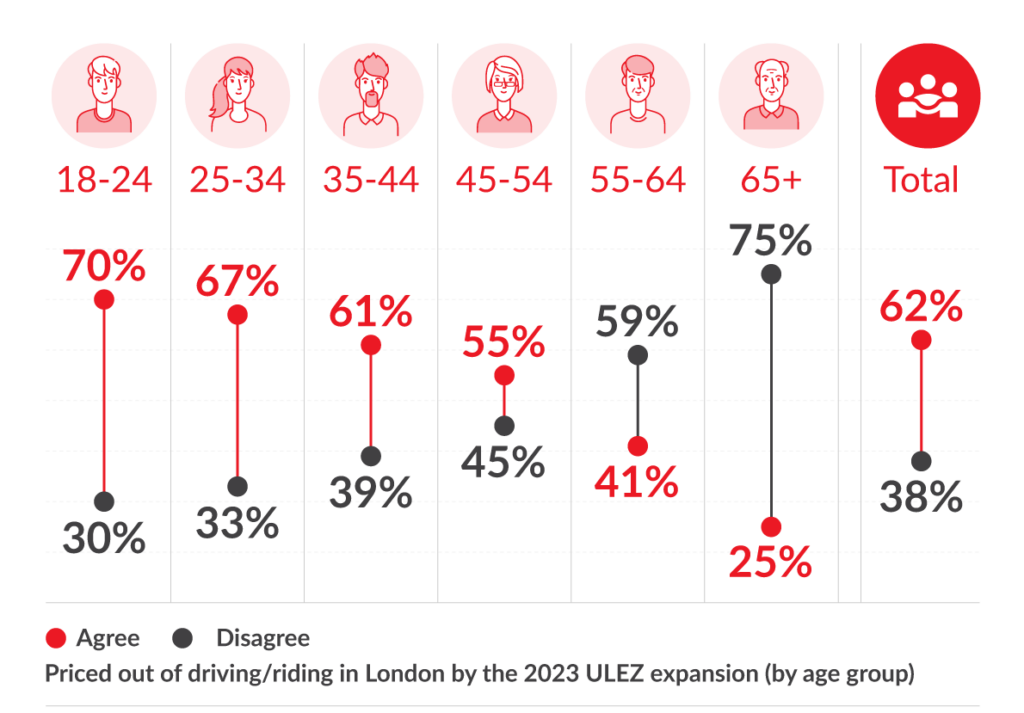
The practical reality of ULEZ, particularly during a cost of living crisis, is that most people will be less likely to drive within the zone because it has become unaffordable for them.
Understandably, younger generations are feeling the strain more than other age groups, with more than two-thirds of 18-34-year-olds saying they felt priced out.
In fact, the only age groups where the majority disagree with ULEZ being unaffordable are 55-64 and the over 65s, meaning the majority of working-age people, particularly motorcyclists (76%), are now less likely to drive in the zone for purely financial reasons.
Finding alternative transport
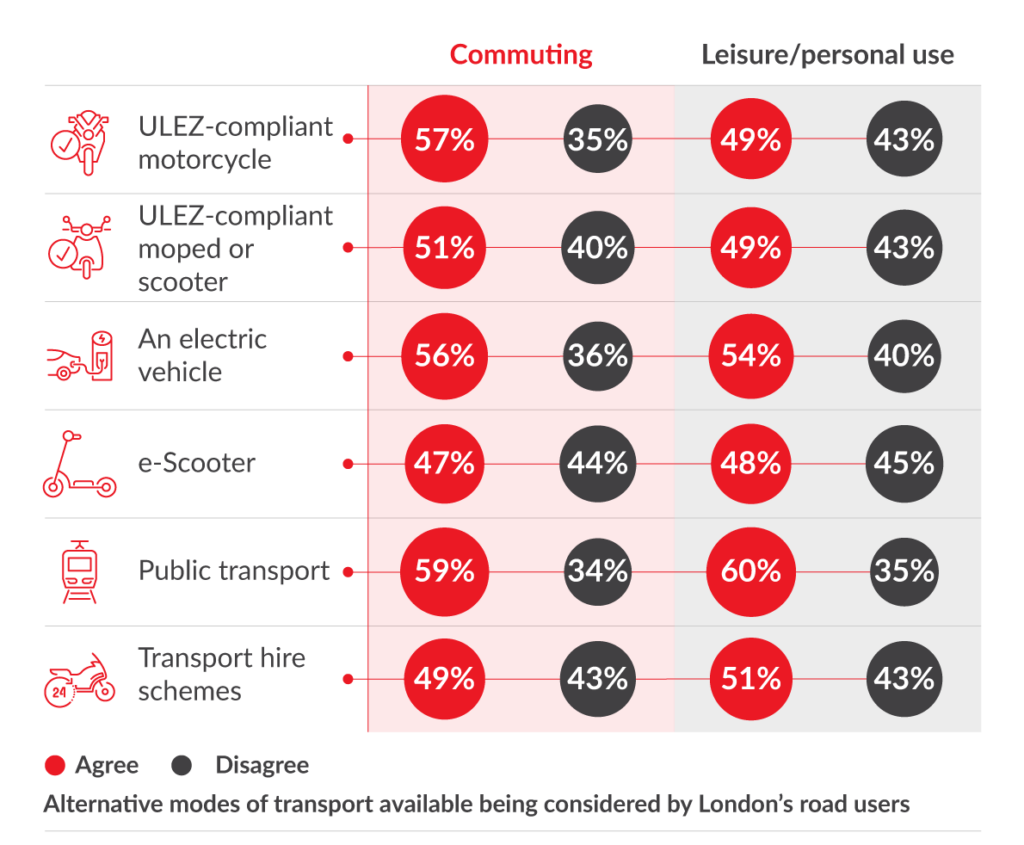
With so many working-age people feeling unable to drive into London’s ULEZ zones, how are they planning to get around?
Many said they would choose to switch to a lower-emission vehicle, but a slim majority of people (59%) said they would instead consider public transport, which is a logical choice, particularly for commuters. However, the August 2023 expansion means there will be close to 700,000 cars required to pay for using ULEZ zones. On a transport network currently struggling with strikes, this additional demand could have a negative impact on the quality of public transport services.
Switching from cars to smaller vehicles, such as bikes and scooters, is another popular consideration. With ULEZ-compliant motorcycles being almost as popular an alternative as public transport among commuters, motorcycles appear to find a balance between personal autonomy, cost and environmental impact for many road users.
Find out more with Bikesure’s guide to ULEZ for motorcycles.
An electric future?
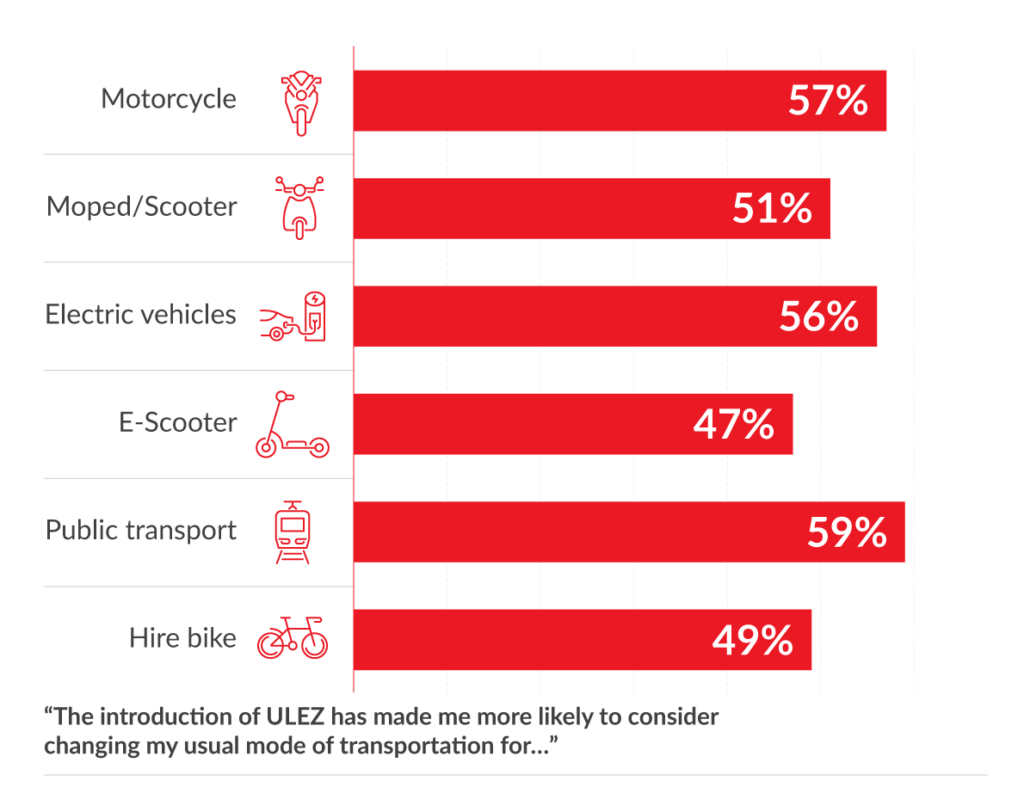
Doing your bit to protect the environment is a clear plus point of ULEZ. Directly because of the expansion, the majority of riders are now more aware of their environmental impact and are consequently choosing to reduce their time on the roads in congested areas. Some 66% agree that the introduction of ULEZ and upcoming expansion has made them more aware of their environmental impact and less likely to drive or ride in the zone as a result. While it is close, more people are put off by environmental impact rather than financial concern.
Of course, people still need to get around – and the option of electric vehicles is becoming more attractive. 54% of car drivers and 73% of motorcycle riders surveyed said they are now more likely to consider switching their current mode of transportation for commuting to an electric vehicle.
Motorcyclists are the group most likely to switch, with motorcyclists also more likely to consider e-scooters than car owners.
Summary
As the 2023 ULEZ expansion moves from plan to reality, we can see that this much-debated scheme continues to impact the way that Londoners approach travel and commuting. Motorcycles, electric vehicles and public transport all look set to grow in popularity as a direct response, demonstrating that people understand the environmental need for greener transport. However, the scepticism we have seen over recent years does not seem to be fading, as road users feel forced to change their commuting habits due to their financial situation. Over time, this will ease as greener vehicles become more widespread and more affordable.
Whether you’re switching to a bike because of ULEZ or you have been riding for decades, it’s important to get the right motorcycle insurance policy for your bike. Call 0330 123 1028 or book a callback at a time that suits you.






